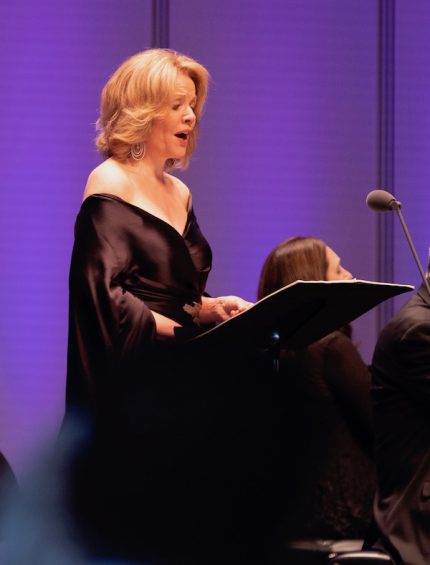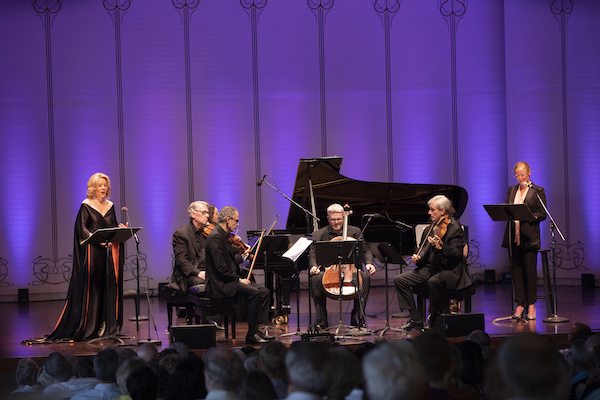Previn’s texty swan song gets royal treatment from Fleming and friends in Ravinia premiere

Perhaps no recent premiere of a big new American chamber work came cloaked with as much prestige as that of André Previn’s swan song, the monodrama for soprano, narrator, pianist and string quartet titled Penelope.
The Boston Symphony Orchestra co-commissioned the 40-minute collaboration between the polymath composer/conductor/pianist and the renowned British playwright Tom Stoppard (Rosencrantz and Guildenstern Are Dead), based on Homer’s epic Greek poem The Odyssey, as the centerpiece of a gala 90th birthday Previn celebration this summer at the Tanglewood Festival in Lenox, Massachusetts.
Previn died in February, two months shy of reaching nonagenarian status. The world premiere went ahead as scheduled July 24 at the BSO’s summer home, performed by the glamorous roster of performers Previn had chosen to introduce his final work to the world—superstar soprano Renée Fleming (to whom Penelope is dedicated), pianist Simone Dinnerstein, and the Emerson String Quartet. Actress Uma Thurman took the role of narrator on that occasion.
Previn’s valedictory opus arrived at Ravinia on Sunday, the second stop on an 11-month tour of Penelope’s co-commissioners. Ravinia’s Martin Theatre was sold out, and a giant video screen was set up outside the theater to accommodate lawn denizens. “We hope [Previn] is somehow with us,” Fleming told the audience at the end of Sunday’s much-anticipated Ravinia and Midwest premiere.
It’s impossible to know the exact form Penelope would have taken had the prolific Previn lived to complete it. The score remained in manuscript form at his death, and it was left to David Fetherolf, his friend and longtime editor at the publishing house G. Schirmer, to realize a performable edition based on the composer’s musical shorthand. Certain passages of text had yet to be designated as either sung by the soprano or spoken by the narrator. Fleming had proposed that Previn add spoken narration, thus relieving her from having to sing almost nonstop for some 40 minutes. Accordingly, Fetherolf replaced many of the sung parts with other pages of manuscript containing spoken text.

Thus the version of Penelope heard here on Sunday—Tony-winning actress Jennifer Ehle, a veteran star of four Stoppard plays, handled the spoken passages—must stand as the most faithful representation of what we know to have been Previn’s final musical intentions.
Previn was an elegant and adept craftsman, and his settings of English words—here, and in his other vocal works (including his 1998 opera A Streetcar Named Desire, whose starring role of Blanche Dubois was written for Fleming—put him right up there with Barber, Copland and Bernstein. His unapologetically conservative idiom draws on an accessible diatonic tonal melodism.
Not the least successful aspect of Penelope is its seamless interweaving of sung and spoken portions with instrumental accompaniment. Sunday’s stellar roster gave it a dedicated performance that drew a warm reception from the SRO audience.
Stoppard’s text reflects Penelope’s shifting emotions—anxiety, despair, disbelief, rapture—as the faithful wife awaits the return of her husband Odysseus from the Trojan War to Ithaca and their marriage bed. The language is contemporary, at times raw: At one point, Penelope is described as having “the glow of a goddess and a bottom like a cleft peach.”
The narration is at once the work’s strongest and most confining element—confining in that the need to stick to a tight narrative arc prohibits the kind of gorgeous lyrical expansion Fleming’s fans would expect from a piece that assigns her top billing. We expect the climactic scene, in which Penelope recognizes a filthy beggar as her long-lost husband, to be a “gotcha” moment, musically speaking. Alas, the necessity of quickly getting to the end of the story prohibits that from happening.
In truth, Previn very often in his music generally appears reluctant to really run with an idea. The busy, rather anonymous instrumental undercurrent he provided for Penelope fits into that category; it’s skillfully wrought and supports Stoppard’s powerful text, to be sure, and some would even consider it a blessing that it doesn’t get in the way or call attention to itself. This listener would have loved Previn to dish up just one honest-to-gosh tune reminiscent of his Hollywood-studio days.
The Emerson players threw themselves into their parts with their wonted expertise. There wasn’t much to set off Dinnerstein’s probing musicality beyond a florid, well played mini-cadenza in the middle of a section evoking Penelope’s 20-year-long vigil, as the dutiful wife scans the horizon each morning for “the sail that would bring the last man home from the war.”
Fleming delivered Previn’s declamatory vocal part with her customary tonal luxuriance, charismatic stage presence and fervent commitment to words and music and how they combine to create heightened poetry.
Ehle was a compelling storyteller to the Stoppard manner born, inhabiting her colleague’s wry cadences (“Godfather Zeus, who swanned past Leda’s defenses and begat the slut”) so naturally as to make one hang on every golden word.
The verdict: Penelope lives most gloriously in its language. But one isn’t certain how much of a shelf life the piece will (or should) have beyond the immediate spate of “premiere” performances. Previn, one suspects, will be best remembered for other, better scores, Streetcar in particular.
Violinist Eugene Drucker swapped the first chair with Philip Setzer for the two works that occupied the first half of the program—Haydn’s String Quartet in D Major (Op. 71, no. 2) and Samuel Barber’s 1943 String Quartet.
The violinists traded Haydn’s felicitous invention with their equally accomplished colleagues, violist Lawrence Dutton and cellist Paul Watkins, like members of an Olympian relay team. If Papa Haydn appeared rather gruff on this occasion, it was not for lack of vitality on the part of these well-seasoned virtuosos.
Better was the Barber. The foursome asserted itself with tremendous verve and panache, especially in the great central Adagio, which, in its famous arrangement for string orchestra, has long been the composer’s Greatest Hit. The Emerson played it more urgently than other quartets usually do, the part-writing beautifully meshed, the expressive intensity firmly sustained.
Previn’s Penelope will be performed at the Aspen Festival on Thursday and the Kennedy Center May 14, 2020. kennedy-center.org